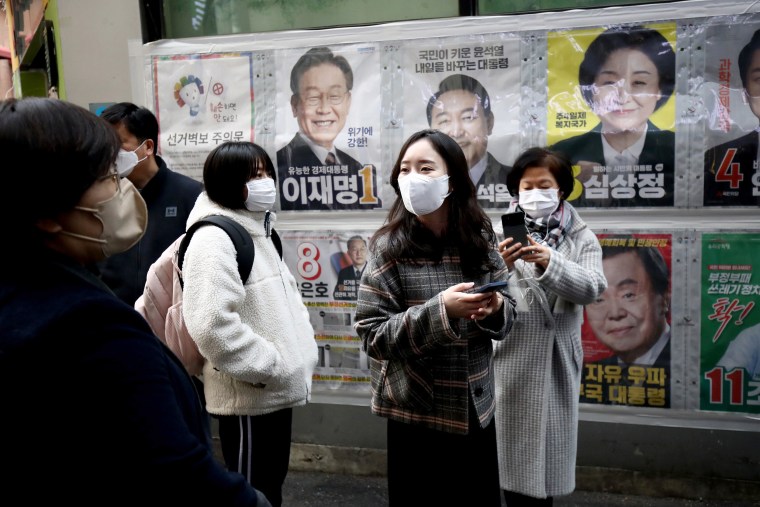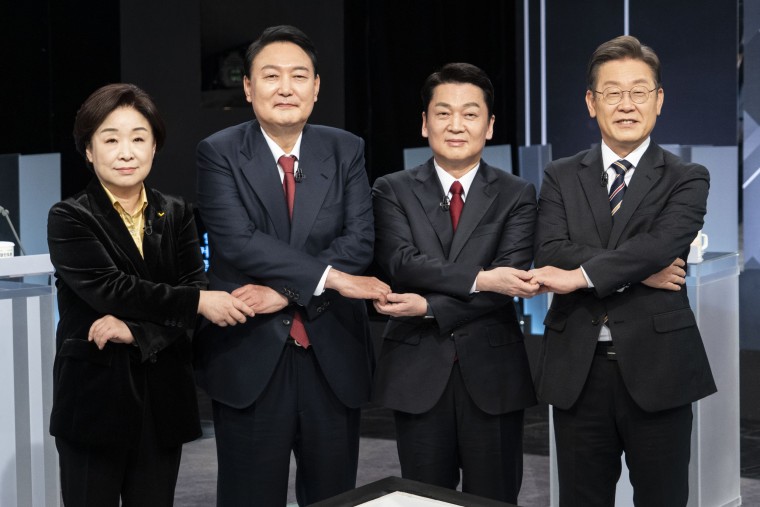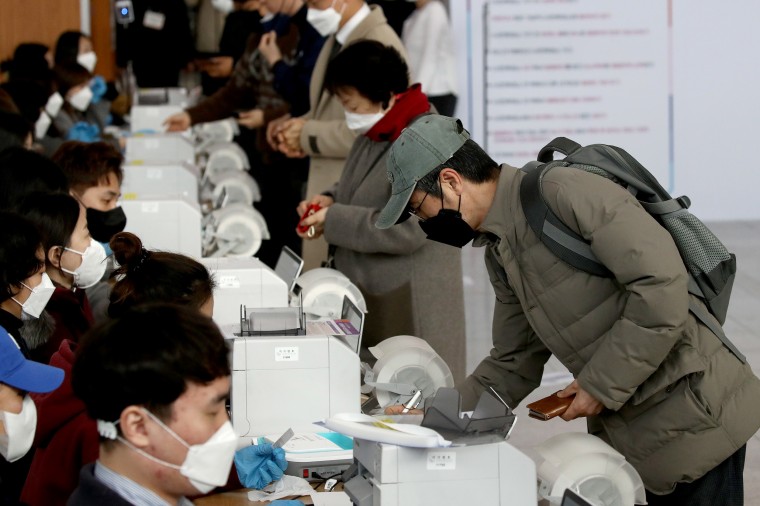SEOUL, South Korea — The race between South Korea’s two leading presidential candidates has seen unprecedented levels of toxic rhetoric, mudslinging and lawsuits.
How bad is it?
“Hitler,” “beast,” and “parasite” are some of the choicer insults leveled by both camps. Some are even calling it “the Squid Game election,” in reference to Netflix’s megahit survival drama in which people are killed if they lose children’s games.
And the stakes? There’s widespread speculation that the loser will be arrested.
“It’s a dreadful presidential election when the losing contender faces prison. Please survive this dogfight in the mire!” senior opposition politician Hong Joon-pyo wrote on Facebook.
Download the NBC News app for breaking news and politics
Just days before Wednesday’s election, Lee Jae-myung from the liberal governing Democratic Party and Yoon Suk Yeol from the main conservative opposition People Power Party are locked in an extremely tight race. The current president, Moon Jae-in, cannot seek re-election because of term limits.
The two candidates’ negative campaigns are aggravating South Korea’s already severe political divide at a time when it faces a battered, pandemic-hit economy, a balancing act over competition between its main ally, Washington, and its top trading partner, China, and a raft of threats and weapons tests from rival North Korea.
The acrimony was underlined on Monday when Song Young-gil, the chairman of South Korea’s governing Democratic Party, was assaulted by a man wielding a hammer-like object during a rally for Lee. Both candidates condemned the attack on Song, who appeared to have avoided serious injury.
Opinion surveys show that both candidates have more critics than supporters.

“Isn’t our national future too bleak with an unpleasant and bitter presidential election that calls for choosing the lesser of two evils?” the mass-circulation Dong-A Ilbo newspaper said in an editorial.
Yoon has slammed Lee over his possible ties to an allegedly corrupt land development scandal. Lee has denied any connection, and in turn has tried to link Yoon to the same scandal, while separately criticizing him for his reported ties to shamanism — an ancient, indigenous religious belief.
There have also been attacks on the candidates’ wives, both of whom have been forced to apologize over separate scandals.
Yoon described Lee’s party as “Hitler” and “Mussolini” while an associate called Lee’s purported aides “parasites.” Lee’s allies called Yoon a “beast,” a “dictator” and “an empty can” and derided his wife’s alleged plastic surgery.
Their campaign teams and supporters have filed dozens of lawsuits charging libel and the spread of false information, among other issues.
“This year’s presidential election has been more overwhelmed by negative campaigning than any other previous election, and the mutual hatred won’t easily die down after the election,” said Choi Jin, director of the Seoul-based Institute of Presidential Leadership.
Among the fault lines in the electorate are South Korean regional rivalries, views on North Korea, a conflict between generations, economic inequality and women’s rights issues.
Yoon is more popular with older voters and those in the southeastern region of Gyeongsang, where past conservative and authoritarian leaders came from. His supporters typically advocate a stronger military alliance with the United States and a tougher line on North Korea, and they credit past authoritarian rulers for quickly developing the economy after the Korean War.

Lee enjoys greater support from middle-aged people and those from Jeolla province, Gyeongsang’s rival region in the southwest. His supporters generally want an equal footing in relations with the United States and rapprochement with North Korea while being extremely critical of past authoritarian rulers’ human rights records.
Both candidates are now focused on winning support from the youngest voters, who have turned away from Moon’s liberal party.
South Korea’s deep divisions are reflected in the troubles of the last three leaders. Their supporters say intense corruption investigations after they left office were politically motivated by their rivals.
During a recent TV debate, Yoon and Lee agreed not to launch politically motivated investigations against the other side if they win. But some question their sincerity.
In a newspaper interview last month, Yoon said that if elected, his government would investigate possible wrongdoing by the Moon government and also the land development scandal that Lee has been allegedly linked to.
When Moon’s government was conducting widespread investigations of past conservative governments, Lee said they were necessary to eradicate “deep-rooted evils and injustice.”
Cho Jinman, a professor at Seoul’s Duksung Women’s University, said a new president must exercise restraint and calm calls for political revenge by hard-line supporters.
“We now have an election race like ‘Squid Game,’ but it will be a new president’s responsibility to pull us out of it,” he said.
